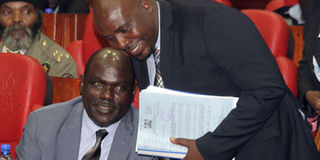IEBC chairman Chebukati seeks advice on poll errors

Independent Electoral and Boundaries Commission chairman Wafula Chebukati (left) and Kenya National Commission on Human Rights vice-chairperson George Morara talk at County hall, Nairobi, during proceedings of the proposed amendment to the electoral laws, on October 5, 2017. The Supreme Court faulted the agency for bungling the recent election. PHOTO | EVANS HABIL | NATION MEDIA GROUP
What you need to know:
- The court nullified the August 8 presidential results citing irregularities and illegalities in the transmission of results.
- Five judges of the Court of Appeal ruled on June 2017 that the results declared at the constituency level are final.
The Supreme Court will on Monday give directions in a case filed by the electoral commission that seeks to clarify how to treat discrepancies, in case they are noted during verification of the presidential results.
Parties were notified on Friday to appear before the court on Monday for directions on how the matter will proceed.
Through lawyer Kamau Karori, Independent Electoral and Boundaries Commission (IEBC) chairman Wafula Chebukati wants the court to clarify what he ought to do with the errors, if any, after verifying the forms.
FORMS 34B
According to Mr Karori, there is confusion in the judgment of the court, issued on September 20, because the judges maintained that the chairman must verify the results before declaring the presidential winner.
He said it is necessary that the court clarifies whether Mr Chebukati and the commission can correct errors in Forms 34B, when the results do not tally or conform with the results captured in Forms 34A.
“Clearly, there was an oversight in the judgment to the extent that the court did not complete its directions on how the 2nd Respondent (the chairman) should handle or treat any discrepancy in the tallies in Forms 34B when compared with the tally of the results in Forms 34A,” Mr Chebukati said in an affidavit.
RULING
When contacted on Saturday, National Super Alliance lawyer Jackson Awele said they were served with the court documents on Thursday and are yet to file their response in court.
“We are working on it,” he said.
The court, in a majority decision, nullified the August 8 presidential results citing irregularities and illegalities in the transmission of results.
Chief Justice David Maraga, DCJ Philomena Mwilu, Justices Smokin Wanjala and Isaac Lenaola ruled that the illegalities and irregularities were of substantial nature to affect the final outcome.
Justices Jackton Ojwang’ and Njoki Ndung’u dissented.
RESULTS
The commission said there is more confusion since the court, quoting the Court of Appeal in the Maina Kiai case, expressly stated that the chairman cannot correct, vary, confirm, alter, modify or adjust the results transmitted to the National Tallying Centre from the Constituency Tallying Centre.
In the Maina Kiai case, five judges of the Court of Appeal ruled on June 2017 that the results declared at the constituency level are final and that it is only an election court that can correct an error noted in the statutory forms.
The Court of Appeal had said it would be “fallacious and flies in the face of clear principles and values of the Constitution” to claim that the IEBC chairman can alone at the National Tallying Centre or wherever, “purport to confirm, vary, or verify the results arrived at through an open, transparent and participatory process”.
ILLEGAL
The judges were of the view that the chairman is represented by his officers at all the 40,883 polling stations, all the constituencies and county tallying centres.
Mr Chebukati argued that despite agreeing with the Court of Appeal decision, the Supreme Court criticised him and the commission for presenting figures that did not add up, on the basis that his hands had been tied by the Maina Kiai case.
According to the IEBC chairman, the Supreme Court “emphatically stated that in the course of verification, the numbers must add up”.
In the majority decision, the judges of the Supreme Court said that failure by the commission to verify the results in consultation with the chairman before he declared the winner, went against the expectation of Article 138 (3) (c) of the Constitution.
VERIFY
In their view, there was little or nothing in the Court of Appeal decision to suggest that the commission failed to verify the forms because the appellate court had restrained or barred them from verifying the results before declaring the winner.
“In its judgment found on page 159 paragraph 365-367 that I am required to verify the Forms 34B against the result in Forms 34A, it was necessary for this honourable court to complete that direction by stating what I am supposed to do in case I find a discrepancy between the two forms,” Mr Chebukati said.
CONFUSION
He said there is a clear disconnect between the directions by the Court of Appeal and the judgment of the Supreme Court, where the judges of the latter court stated that the commission should compare the results reflected in Forms 34B against those in Forms 34A.
While nullifying the August 8 presidential election results, the Supreme Court stated that elections are not only about numbers.
“…that even in numbers, as taught in school, to arrive at a mathematical solution, there is always a computational path one has to take, as proof that the process indeed gives rise to the stated solution. Elections are not events but processes,” the judges said.
The court further faulted the electoral body and Mr Chebukati, saying they failed to offer any plausible response to the question as to whether all Forms 34A had been electronically transmitted to the National Tallying Centre as required by Section 39 (1C) of the Elections Act.




